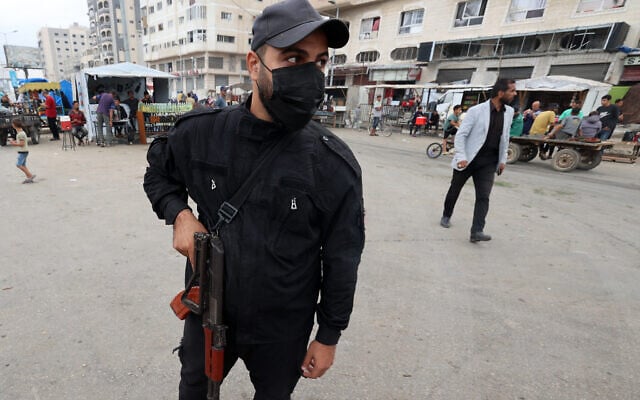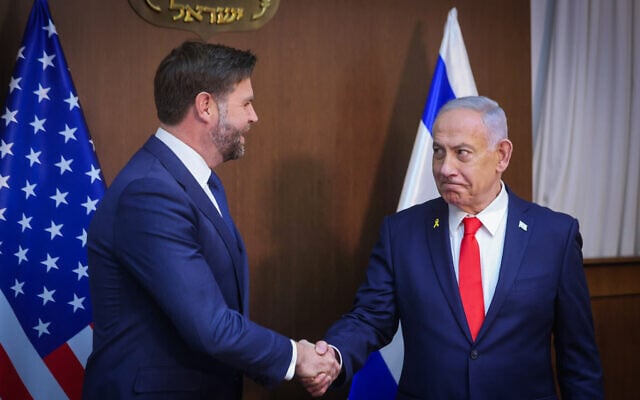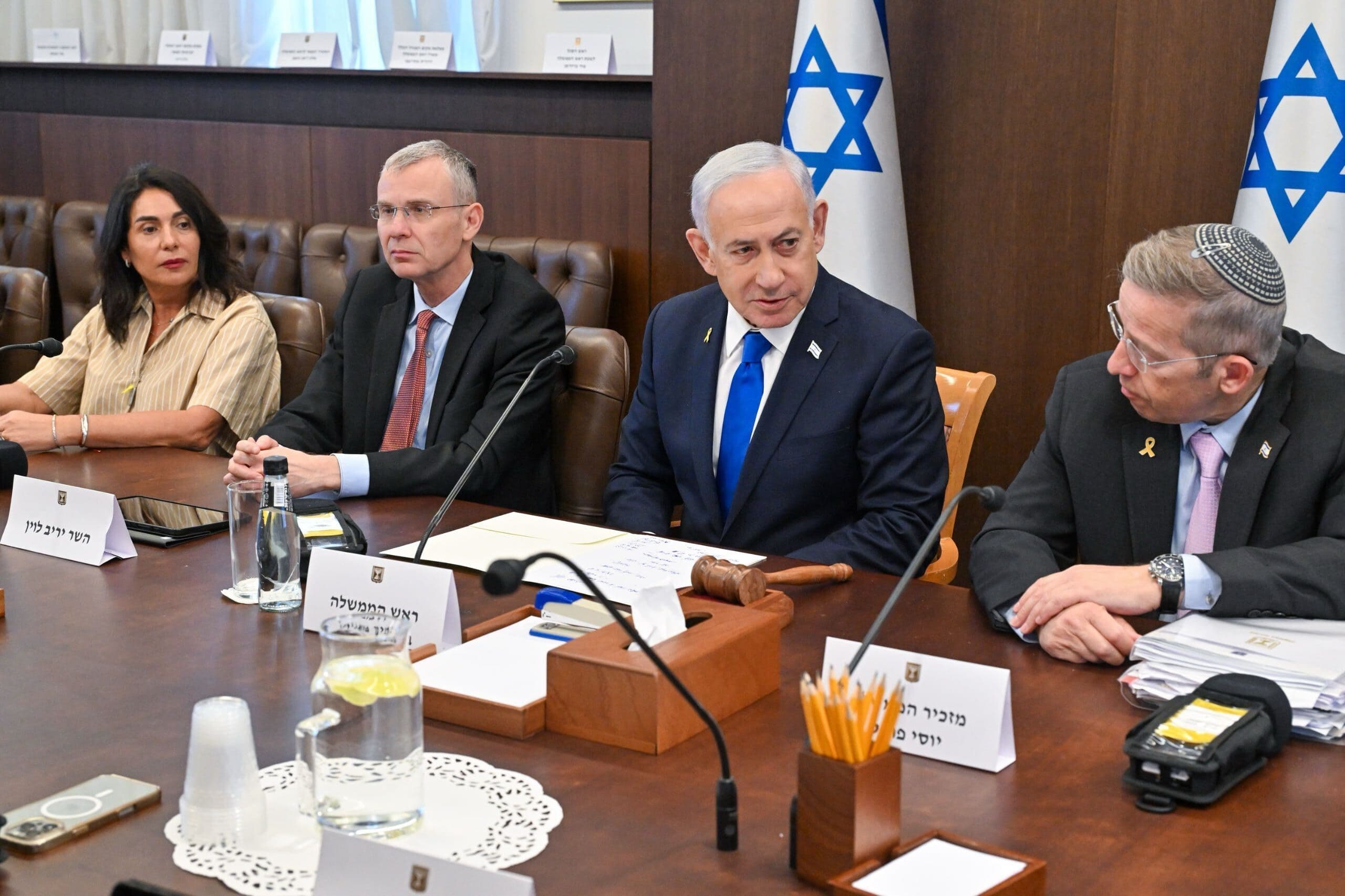Prime Minister Benjamin Netanyahu insisted on Sunday that Israel is a sovereign state that makes its own decisions on national security matters, in the wake of growing rumblings that key decisions about the future of the Gaza Strip are being made in Washington. He also specified that Israel would determine which countries would be permitted to send troops to Gaza within the framework of US President Donald Trump’s Gaza peace plan.
In the latest report of US oversight, the Ynet news outlet reported that a strike in central Gaza on Saturday targeting a Palestinian Islamic Jihad operative planning an “imminent attack” against troops was carried out only after authorization was received from American officials.
Speaking at the start of the weekly cabinet meeting, Netanyahu blasted “ridiculous claims about the relationship between the United States and Israel.”
“When I was in Washington, [people] said I control the American government, that I dictate its security policy,” he said. “Now they claim the opposite — that the American administration controls me and dictates Israel’s security policy.”
“Neither is true,” Netanyahu declared.
A series of senior US officials came to Israel last week to oversee the implementation of phase one of the Gaza ceasefire.
“Israel is a sovereign state,” the prime minister stressed. “The United States is a sovereign state. Our relationship is a partnership.”

Much of the criticism surrounding Israel’s freedom to act in Gaza emerged after a deadly attack killed two IDF soldiers in Rafah last week. The IDF blamed Hamas for the attack and launched a wave of intense strikes against the terror group in response, but quickly returned to the ceasefire after the US allegedly pressured Jerusalem to rein in its reaction. Hamas had said the incident occurred in an area under Israeli control where it claimed to have had no contact with its operatives for months.
“I want to make one thing clear — our security policy is in our own hands,” Netanyahu continued. “We will not tolerate attacks against us; we respond at our discretion to attacks, as we have done in Lebanon and most recently in Gaza. We dropped 150 tons on Hamas and on terror elements after the attack on our two soldiers. And of course we also thwart dangers while they are forming before they are carried out, as we did only yesterday in the Gaza Strip.”
Netanyahu said that Israel “does not seek anyone’s approval for that. We control our own security and we have also made clear regarding international forces that Israel will determine which forces are unacceptable to us — that is how we act and will continue to act.
“This, of course, is accepted by the United States, as its most senior representatives have said in recent days,” he said, adding that “we will continue to control our fate.”
Netanyahu’s office told The Times of Israel last week that it would not accept the deployment of Turkish troops, and the government reportedly remains firmly opposed to any role for the Palestinian Authority in Gaza.
On Saturday, the IDF said it carried out a drone strike in central Gaza’s Nuseirat, targeting a Palestinian Islamic Jihad operative who was planning an “imminent attack” against troops.
Palestinian media reported that one person was killed and others were injured in the strike, which hit a car in the Nuseirat area.
Nuseirat is on the western side of the Yellow Line, meaning it is not under Israeli control according to the terms of the ceasefire.

Ynet, citing sources familiar with the incident, reported that discussions about carrying out the strike were held at the most senior levels of the Israel Defense Forces, then by government leaders, before being coordinated with the US, including CENTCOM, which oversees US operations in the Middle East, including those relating to Israel.
According to the report, that kind of strike on a terror operative would, in the past during the Gaza war, have required approval no higher than an IDF division commander.
After the deadly attack on IDF soldiers and the wave of strikes in response last Sunday, top White House aides Jared Kushner and Steve Witkoff rushed to Israel and arrived on Monday, followed by US Vice President JD Vance the next day. US Secretary of State Marco Rubio then arrived on Friday. All the US officials visited the US-Israel Civil-Military Coordination Center in Kiryat Gat, which has been set up to oversee the ceasefire and the continued implementation of the Trump plan.
At a joint press conference on Wednesday, Netanyahu and Vance both pushed back against the suggestion that Israel has become a “client state” of the US.
“I want to put it very clearly,” Netanyahu said in response to a question on the matter. “One week, they say that Israel controls the United States. A week later, they say the United States controls Israel. This is hogwash.”
Vance made similar comments on the relationship between the countries, saying: “We don’t want a client state, and that’s not what Israel is. We want a partnership. We want an ally here.”
He said his visit and those of other senior officials were aimed at monitoring the ceasefire. But, he clarified, “It’s not about monitoring in the sense of, you know, you monitor a toddler. It’s about monitoring in the sense that there’s a lot of work, a lot of good people who are doing that work, and it’s important for the principals in the administration to keep on ensuring that our people are doing what we need them to do.”

Trump’s 20-point ceasefire plan halted the war that erupted when the Palestinian terror group Hamas led a devastating invasion of southern Israel on October 7, 2023, that killed 1,200 people, and during which 251 were abducted as hostages to the Gaza Strip.

